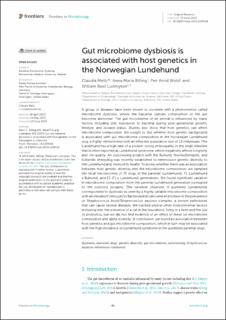| dc.contributor.author | Melis, Claudia | |
| dc.contributor.author | Billing, Anna Maria | |
| dc.contributor.author | Wold, Per-Arvid | |
| dc.contributor.author | Ludington, William Basil | |
| dc.coverage.spatial | Norway | en_US |
| dc.date.accessioned | 2023-06-20T08:56:37Z | |
| dc.date.available | 2023-06-20T08:56:37Z | |
| dc.date.created | 2023-06-19T09:24:03Z | |
| dc.date.issued | 2023-06-19 | |
| dc.identifier.citation | Frontiers in Microbiology. 2023, 14, 1-12. | en_US |
| dc.identifier.issn | 1664-302X | |
| dc.identifier.uri | https://hdl.handle.net/11250/3072228 | |
| dc.description.abstract | A group of diseases have been shown to correlate with a phenomenon called microbiome dysbiosis, where the bacterial species composition of the gut becomes abnormal. The gut microbiome of an animal is influenced by many factors including diet, exposures to bacteria during post-gestational growth, lifestyle, and disease status. Studies also show that host genetics can affect microbiome composition. We sought to test whether host genetic background is associated with gut microbiome composition in the Norwegian Lundehund dog, a highly inbred breed with an effective population size of 13 individuals. The Lundehund has a high rate of a protein-losing enteropathy in the small intestine that is often reported as Lundehund syndrome, which negatively affects longevity and life-quality. An outcrossing project with the Buhund, Norrbottenspets, and Icelandic sheepdog was recently established to reintroduce genetic diversity to the Lundehund and improve its health. To assess whether there was an association between host genetic diversity and the microbiome composition, we sampled the fecal microbiomes of 75 dogs of the parental (Lundehund), F1 (Lundehund x Buhund), and F2 (F1 x Lundehund) generations. We found significant variation in microbiome composition from the parental Lundehund generation compared to the outcross progeny. The variation observed in purebred Lundehunds corresponded to dysbiosis as seen by a highly variable microbiome composition with an elevated Firmicutes to Bacteroidetes ratio and an increase in the prevalence of Streptococcus bovis/Streptococcus equinus complex, a known pathobiont that can cause several diseases. We tracked several other environmental factors including diet, the presence of a cat in the household, living in a farm and the use of probiotics, but we did not find evidence of an effect of these on microbiome composition and alpha diversity. In conclusion, we found an association between host genetics and gut microbiome composition, which in turn may be associated with the high incidence of Lundehund syndrome in the purebred parental dogs. | en_US |
| dc.description.abstract | Gut microbiome dysbiosis is associated with host genetics in the Norwegian Lundehund | en_US |
| dc.language.iso | eng | en_US |
| dc.publisher | Frontiers Media S.A. | en_US |
| dc.rights | Navngivelse 4.0 Internasjonal | * |
| dc.rights.uri | http://creativecommons.org/licenses/by/4.0/deed.no | * |
| dc.title | Gut microbiome dysbiosis is associated with host genetics in the Norwegian Lundehund | en_US |
| dc.title.alternative | Gut microbiome dysbiosis is associated with host genetics in the Norwegian Lundehund | en_US |
| dc.type | Peer reviewed | en_US |
| dc.type | Journal article | en_US |
| dc.description.version | publishedVersion | en_US |
| dc.rights.holder | ©2023 Authors | en_US |
| dc.subject.nsi | VDP::Matematikk og Naturvitenskap: 400::Basale biofag: 470::Generell mikrobiologi: 472 | en_US |
| dc.source.pagenumber | 1-12. | en_US |
| dc.source.volume | 14 | en_US |
| dc.source.journal | Frontiers in Microbiology | en_US |
| dc.identifier.doi | 10.3389/fmicb.2023.1209158 | |
| dc.identifier.cristin | 2155618 | |
| cristin.ispublished | true | |
| cristin.fulltext | original | |
| cristin.qualitycode | 2 | |

